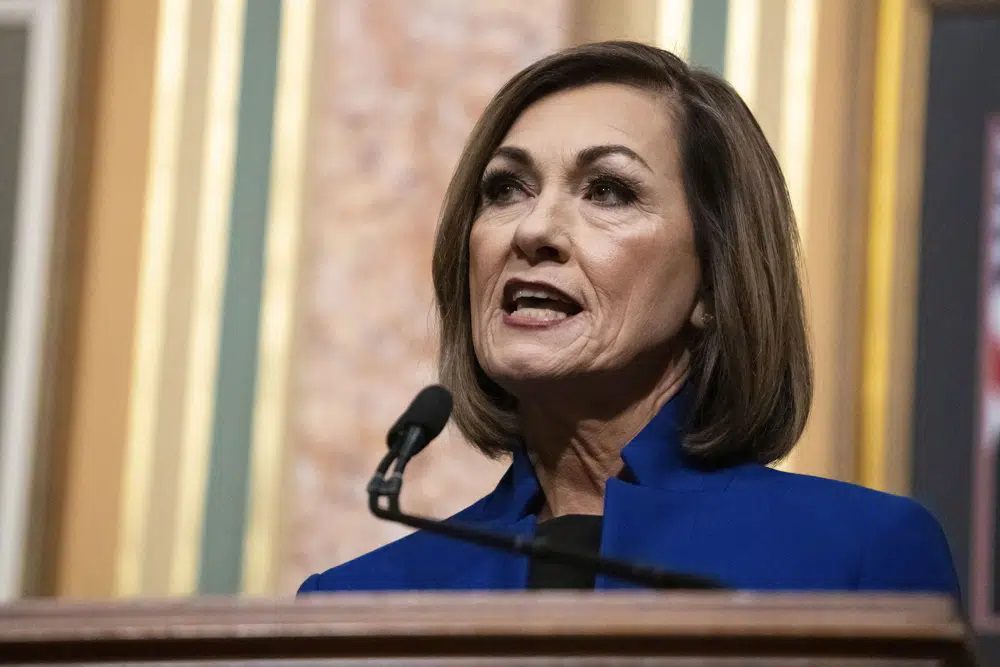Gov. Reynolds signs school voucher bill after Iowa Senate passes vote

Gov. Kim Reynolds gives the Condition of the State address to members of the Iowa Legislature inside the House Chamber, on Tuesday, Jan. 10, 2023, at the Iowa State Capitol, in Des Moines. (Kelsey Kremer/The Des Moines Register via AP)
(ABC 6 News) – Iowa Gov. Kim Reynolds’ signature education bill was signed into law on Tuesday after passing in the Iowa House and Senate, but not before hours of rigorous debate.
Iowa Republicans, who hold wide majorities in the House and Senate, passed “The Students First Act” in a vote of 31 to 18 around 12:30 a.m. Tuesday. On Monday, it passed the Iowa House 54 to 45.
The bill contains education savings accounts for Iowa students and families to use toward private schooling. With the bill in place, every Iowa student would have the option of using more than $7,500 in state money each year to pay for private school.
Gov. Reynolds, a Republican, has tried unsuccessfully twice before to enact a less expansive program of taxpayer-funded scholarships for private school.
RELATED: Iowa Gov. Reynolds seeks state funding for private schools
Gov. Reynolds released a statement shortly after the vote, saying she plans to sign the bill into law later on Tuesday.
“I am thrilled that both the Iowa House and the Iowa Senate have passed the Students First Act,” said Reynolds. “For the first time, we will fund students instead of a system, a decisive step in ensuring that every child in Iowa can receive the best education possible. Parents, not the government, can now choose the education setting best suited to their child regardless of their income or zip code.”
During debate Monday night, Rep. Steven Holt, a Republican from Denison, said Democrats were overstating what the private school funding would mean to public schools.
“If in fact a huge number of students were to leave public schools to attend accredited private schools, then it becomes profoundly clear just how important it was that we gave parents greater choice, since such an exodus would lay bare the realities that these schools were not meeting the needs of our students,” Crawford said.
Democratic legislators and other opponents of the plan countered that Iowa lawmakers have for years provided inadequate support, forcing districts to repeatedly cut their budgets. They said the new plan would worsen that funding problems, especially hurting the state’s largest urban district and some of its smallest rural districts.
They noted that nearly half of Iowa’s 99 counties don’t have a private school and that most of the new funding will go to schools in the state’s largest cities.
“This legislation is a blank check to private schools in Iowa’s biggest, wealthiest cities with no oversight, no accountability. And when it all falls apart, rural schools that close as a result of this legislation cannot just reopen easily,” said Rep. Sami Scheetz, a Democrat from Cedar Rapids.
“Private school vouchers will hurt local schools, weaken rural communities, and reduce opportunity for the vast majority of Iowa kids,” said Iowa State Senator Molly Donahue of Cedar Rapids.
Kari Mahler, a first grade teacher in East Sac County Community School District in largely rural northwest Iowa, said her biggest concern with the new program is that it provides public money to private schools even though those schools don’t have to accept all students, including those with disabilities.
Coming after some difficult years as teachers tried to navigate the COVID-19 crisis, Mahler said, the plan leaves her feeling discouraged.
“It feels like we’re just getting beaten down again,” she said.
However, for supporters of the plan like Oliver Bardwell, of Waukee, a Des Moines suburb, the key is to give parents more options.
“Parents want a voice, and they want a choice,” Bardwell said at a public hearing last week about the plan. “They want to be heard and they want their children to have the opportunity to an education that aligns with their family’s values.”
Kevin Welner, director of the National Education Policy Center at the University of Colorado Boulder, said regardless of whether public funding of private schools is fair, research shows that on average, students who leave public schools usually don’t benefit. Much of that outcome depends on the quality of a private school, and that can vary dramatically, Welner said in an email.
“If using a voucher to move to private school hasn’t been beneficial, the obvious policy question is why? And the obvious answer is that the private schools haven’t been very good,” Welner said. “We know that some private schools are excellent, while others are awful. There’s quite a variation.”
The Associated Press contributed to this report.